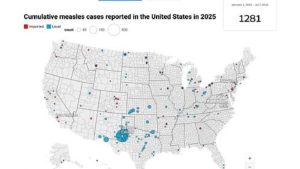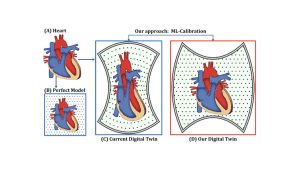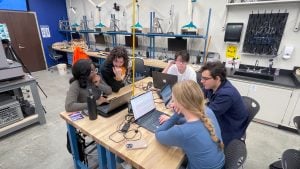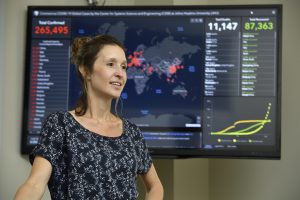We prepare students with the technical and humanistic perspectives and the skills and experiences needed to apply their knowledge in a broad range of professional fields.
| Application deadlines | November 1, 2025 for spring 2026 admission December 1, 2025 for fall 2026 early admission March 15, 2026 for Fall 2026 regular admission |
| Average time to degree completion | Four full-time semesters |
| Tuition | Full-time residential student: $66,670 annually / $33,335 per semester
Part-time residential student: $6,525 minimum tuition (0-3 credits), then $2,175 per credit |
| Funding support | More details here |
No GRE required, and no application fee.
What makes us unique?
-

Integration of civil and systems engineering
We equip students to address complex, interconnected, and large-scale societal challenges by combining traditional engineering with systems thinking, data analysis, and computational methods.
-

Specialized courses
Pursue your passion with courses in historic preservation, natural hazards, and more.
-

Outstanding research facilities
A high temperature structure testing rig for fire engineering and the “Big Blue Baby” for testing thin wall structures are among the department’s specialized facilities
About our program
Two master’s programs in high-demand fields prepare students for professional success:
MSE in Civil Engineering
Focuses on mechanics of materials, probabilistic methods, fire engineering, earthquake engineering, infrastructure design resilience.
MSE in Systems Engineering
Focuses on network modeling, mathematical modeling, optimization, analysis of complex infrastructure systems, public health, urban resilience.
Flexible pathways
In either program, you can choose an academic (coursework) or research (thesis) track, depending on your interests.
The Hopkins network
Join us and you’ll be part of a worldwide network of alumni who are committed to your professional success.
Externship option
Some master’s students can take part in a externship for academic credit, making professional connections and learning about career options.
Excellence and broad expertise
Among our faculty members are a world-renowned expert in tracking pandemics and an engineer whose software program is used globally to understand how fire spreads in structures.
The courses you want
Some of our most popular courses include:
- Additive Manufacturing and Design
- Natural Disaster Risk Modeling
- Smart Transportation and Autonomous Vehicles
- Structural Fire
- Production Systems Analysis
“My knowledge of wind engineering set me apart from others and has allowed me to build and grow a team within Arup.”
—Réamonn Mac Réamoinn, Engr ’15, is an associate at Arup, the global consulting firm. Based in Ireland, he is the wind skills leader for Arup’s Europe region.
The Civil and Systems Engineering master’s student experience
Research
Learn about our areas of research and associated research centers and institutes Learn moreOutcomes-oriented
We prepare students for professional leadership no matter what career path they choose. Our graduates are leaders in industry and entrepreneurs, working at the forefront of fields from renewable energy, transportation, and consulting to urban planning. Today, the professional opportunities available to civil and systems engineering are evolving and expanding rapidly, in large part as a result of the applications of AI and machine learning to areas ranging from transportation engineering and natural disaster modeling to infectious disease simulation.
| Employers | ||||||||
|
MSE in Civil Engineering
Focuses on mechanics of materials, probabilistic methods, fire engineering, earthquake engineering, infrastructure design resilience.
Requirements for MSE in Civil Engineering with Coursework Requirements
The most common path for MSE graduate students is to complete the degree through coursework alone. The MSE degree requirements are as follows*:
- Minimum course requirements: 8 courses** at the 600-level or above:
- 4 of which must be from civil engineering – EN.560.XXX or EN.565.XXX
- 7 of which must be technical
- Required courses, but do not count towards minimum course requirements:
- Two semesters of CaSE graduate seminar courses (Fall semester – EN.560.691 and/or Spring semester – EN.560.692)
- Academic Ethics short course EN.500.603
- Responsible Conduct of Research short course: AS.360.624 (online)
- Acceptable grades: B- and above. Only one course with a grade lower than B- is allowed toward the degree requirements. No grade lower than a C- may be counted toward the course requirements.
- First three semesters must be full-time. The student may submit a request for the fourth semester to be part-time, which requires approval from the Department Head and is not guaranteed.*** It is expected that the degree will be completed in one year with the student enrolling in 4 courses per semester, although in select cases students may require a third semester of study.
- CPT internship credits for international students do not count toward the completion of a MSE degree.
- Transfer credits typically are not permitted.
*Students must comply with all requirements stipulated by the Whiting School of Engineering Academic Policies and Procedures.
** Academic advisors, in consultation with the faculty in the department, will determine whether the 8 courses (at least 3 credits each and 24 credits total) leading to this degree are appropriate and if they have been completed satisfactorily.
***See the director of your masters degree program or the department academic program administrator to determine if you might be eligible for part-time status.
MSE with Thesis Requirements
The MSE with thesis option is primarily intended for students interested in pursuing a PhD. The MSE degree requirements are as follows*:
- Minimum course requirements: 7 courses** at the 600-level or above:
- 4 of which must be from civil engineering – EN.560.XXX or EN.565.XXX
- 7 of which must be technical
- Required courses, but do not count towards minimum course requirements:
- Research course with research advisor – Fall semester
- Research course with research advisor – Spring semester (a two-semester research sequence)
- Two semesters of CaSE graduate seminar courses (Fall semester – EN.560.691 and/or Spring semester – EN.560.692)
- Academic Ethics short course – EN.500.603
- Responsible Conduct of Research short course: AS.360.625
- Acceptable grades: B- and above. Only one course with a grade lower than B- is allowed toward the degree requirements. No grade lower than a C- may be counted toward the course requirements.
- Final essay that is approved by the research advisor and one additional reader who is required to be a full-time departmental faculty member. Any external reader must be approved by the department chair.
- Research presentation in a public forum attended by two members of the WSE faculty or other faculty approved by the Department Chair.
- The MSE with thesis program is expected to be completed in 3-4 semesters with the student enrolled in 2-3 courses per semester in addition to research. Summer research is typical but not necessary and is left to the discretion of the student and advisor. All semesters must be full-time.
- CPT internship credits for international students do not count toward the completion of a MSE degree.
- Transfer credits typically are not permitted
*Students must comply with all requirements stipulated by the Whiting School of Engineering Academic Policies and Procedures.
**Academic advisors, in consultation with the faculty in the department, will determine whether the 7 courses (at least 3 credits each and 21 credits total) along with research credits leading to this degree are appropriate and if they have been completed satisfactorily.
MS in Systems Engineering
Focuses on network modeling, mathematical modeling, optimization, analysis of complex infrastructure systems, public health, urban resilience.
Requirements for MS in Systems Engineering with Coursework Requirements
The most common path for MS graduate students is to complete the degree through coursework alone. The MS degree requirements are as follows*:
- Minimum course requirements: 8 courses** at the 600-level or above:
- 3 of which must be from the following list (Substitute courses can be considered at the advisors discretion):
- EN.560.601 Applied Math for Engineers
- EN.560.617 Deep Learning for Physical Systems
- EN.560.618 Probabilistic Methods in Civil Engineering and Mechanics
- EN.560.647 Probabilistic Graphical Models and Causal Inference for Networked Systems
- EN.560.650 Operations Research
- EN.560.652 Scientific Machine Learning for Modeling, Optimization, and Control of Dynamical Systems
- EN.560.653 An Introduction to Network Modeling
- EN.560.654 Introduction to Machine Learning and Control for Building Energy Systems
- EN.560.657 System Dynamics
- EN.560.659 Production Systems Analysis
- EN.520.698 Networks Meet Machine Learning: Methods and Applications
- EN.553.613 Applied Statistics and Data Analysis
- EN.553.636 Introduction to Data Science
- EN.601.633 Intro Algorithms
- 5 of which are elective
- 3 of which must be from the following list (Substitute courses can be considered at the advisors discretion):
- Required courses, but do not count towards minimum course requirements:
- Two semesters of CaSE graduate seminar courses (Fall semester – EN.560.691 and/or Spring semester – EN.560.692)
- Academic Ethics short course EN.500.603
- Responsible Conduct of Research short course: AS.360.624 (online)
- Acceptable grades: B- and above. Only one course with a grade lower than B- is allowed toward the degree requirements. No grade lower than a C- may be counted toward the course requirements.
- First three semesters must be full-time. The student may submit a request for the fourth semester to be part-time, which requires approval from the Department Head and is not guaranteed.*** It is expected that the degree will be completed in one year with the student enrolling in 4 courses per semester, although in select cases students may require a third semester of study.
- CPT internship credits for international students do not count toward the completion of a Master’s degree.
- Transfer credits typically are not permitted
*Students must comply with all requirements stipulated by the Whiting School of Engineering Academic Policies and Procedures.
**Academic advisors, in consultation with the faculty in the department, will determine whether the eight courses (at least 3 credits each) leading to this degree are appropriate and if they have been completed satisfactorily.
***See the director of your masters degree program or the department academic program administrator to determine if you are eligible for part-time status.
MS with Thesis Requirements
The MS with thesis option is primarily intended for students interested in pursuing a PhD. The MS degree requirements are as follows*:
- Minimum course requirements: 7 courses** at the 600-level or above:
- 3 of which must be from the following list (Substitute courses can be considered at the advisors discretion):
- EN.560.601 Applied Math for Engineers
- EN.560.617 Deep Learning for Physical Systems
- EN.560.618 Probabilistic Methods in Civil Engineering and Mechanics
- EN.560.647 Probabilistic Graphical Models and Causal Inference for Networked Systems
- EN.560.650 Operations Research
- EN.560.652 Scientific Machine Learning for Modeling, Optimization, and Control of Dynamical Systems
- EN.560.653 An Introduction to Network Modeling
- EN.560.654 Introduction to Machine Learning and Control for Building Energy Systems
- EN.560.657 System Dynamics
- EN.560.659 Production Systems Analysis
- EN.520.698 Networks Meet Machine Learning: Methods and Applications
- EN.553.613 Applied Statistics and Data Analysis
- EN.553.636 Introduction to Data Science
- EN.601.633 Intro Algorithms
- 4 of which are elective
- 3 of which must be from the following list (Substitute courses can be considered at the advisors discretion):
- Required courses, but do not count towards minimum course requirements:
- Research course with research advisor – Fall semester
- Research course with research advisor – Spring semester (a two-semester research sequence)
- Two semesters of CaSE graduate seminar courses (Fall semester – EN.560.691 and/or Spring semester – EN.560.692)
- Academic Ethics short course – EN.500.603
- Responsible Conduct of Research short course: AS.360.625
- Acceptable grades: B- and above. Only one course with a grade lower than B- is allowed toward the degree requirements. No grade lower than a C- may be counted toward the course requirements.
- Final essay that is approved by the research advisor and one additional reader who is required to be a full-time departmental faculty member. Any external reader must be approved by the department chair.
- Research presentation in a public forum attended by two members of the WSE faculty or other faculty approved by the Department Chair.
- The MS with thesis program is expected to be completed in 3-4 semesters with the student enrolled in 2-3 courses per semester in addition to research. Summer research is typical but not necessary and is left to the discretion of the student and advisor. All semesters must be full-time.
- CPT internship credits for international students do not count toward the completion of a Master’s degree.
- Transfer credits typically are not permitted
*Students must comply with all requirements stipulated by the Whiting School of Engineering Academic Policies and Procedures.
**Academic advisors, in consultation with the faculty in the department, will determine whether the seven courses (at least 3 credits each) along with research credits leading to this degree are appropriate and if they have been completed satisfactorily.
Imagine yourself here
Baltimore has so much to offer. From vibrant and diverse neighborhoods with affordable housing, a farmers' market, excellent restaurants and the Baltimore Museum of Art just blocks from campus to professional sports teams, a rich history and a lively culture scene, make Baltimore a great place to call home.
Ready to Apply?
Get the information you need about our application process and financial aid, or get your application started today!
Only at Johns Hopkins

Measles Cases Hit Highest Level Since Declared Eliminated in 2000 - The U.S. Measles Tracker, developed by Lauren Gardner, a professor of civilian systems engineering, and her team in the Center for Systems Science and Engineering, tracks reported measles cases in the U.S. to provide real-time data

Tallest U.S. Cold-Formed Steel Building tested on Earthquake Simulator - The seismic testing will be used to determine the structural limits of cold-formed steel buildings and modernize U.S. building codes

Virtual Hearts Get Smarter - Dimitris Giovanis, an assistant research professor, and Somdatta Goswami, an assistant professor, are co-PIs on a team that is developing new ways to correct errors in existing heart digital twins.
Faculty Spotlight
Lauren Gardner is the Alton and Sandra Cleveland Professor in the Department of Civil and Systems Engineering at Johns Hopkins Whiting School of Engineering and holds a joint appointment in the Bloomberg School of Public Health. She is also a member of the Data Science and AI Institute.
She is the creator of the interactive web-based dashboard used by public health authorities, researchers, and the general public around the globe to track the COVID-19 Pandemic. The dashboard debuted on January 22, 2020, and since has recorded more than 200 billion feature requests.





